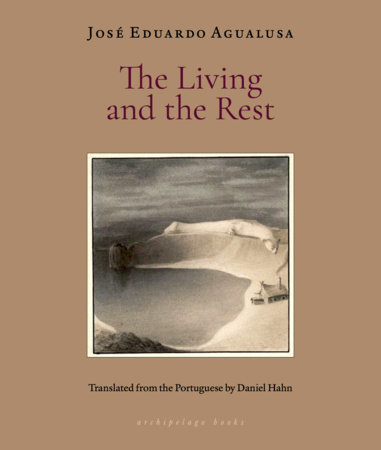Ofélia Eastermann wakes up with four lines dancing around in her head:
“On Friday midnights, Ofélia took the sky, / and wove it with infinity. / Meanwhile, the breeze flowed between palm fronds, / like the spirits’ river-sounds.”
She gets up and jots them down in a small red-covered notebook, on which she has written in coarse black letters: “Dream trash.”
Whenever somebody asks her politely “Where are you from?,” Ofélia shuts her eyes and sees the rough stone beds of the water-courses down which, in the rainy season, sudden rivers flow. She sees the slow gravel paths between the brambles, the rusty carcasses of the ships, the wild dogs hovering over the dunes. She sees a woman with skin dyed ochre-red, thick braids, with a little boy in her arms. “I’m from the South,” she answers. On other occasions, hoping to shock her interlocutors, which she does often, she chooses a different formulation: “I am from all the beds where I’ve been happy.”
On one occasion, during an interview, she got irritated by one of the interviewer’s questions (“You were born in the south of Angola, you were brought up in Lisbon and live in Rio de Janeiro. So really, do you feel more Angolan, Portuguese, or Brazilian?”), and, since indignation is a kind of intoxication, she lost her cool, frightening the journalist with a shout that now appears on hundreds of literary sites, good and bad and terrible ones: “I come from the palm trees—fuck it! Not Angolan, or Brazilian, or Portuguese! Wherever there’s a palm tree, that’s where I’m from! I’m from the sea and the forests and the savannas. I come from a world that hasn’t arrived yet: with no god, no kings, no borders, and no armies.”
Ofélia hates the line, but can do nothing to stop it spreading. People who have never read her poetry, and never will, share that lyrical outburst, like conspirators exchanging watchwords and passwords. Her Brazilian publisher commissioned a T-shirt with the words “I come from the palm trees—fuck it!” to put on sale in bookshops and at literary festivals. Ofélia earns more from the T-shirts than from her books. She gets up, thinking about all this, and looks out the window. She sees Daniel arriving, hurriedly—he’s always nineteen to the dozen, as if he has a permanent gale at his back, pushing him on. Uli Lima is waiting for him on a chair by the pool. Unlike the Angolan, Uli radiates a natural calm, he lives in perpetual Sunday. The two friends exchange a hug, and when she sees them, the poet thinks she’d like to have a writer friend. Male or female. Though a woman seems even more unlikely, she’s always got along better with men. She misses having someone with whom to swap books and opinions, to show crooked lines of verse. She knows what people say about her: she’s arrogant, envious, vain and crazy. Crazy’s fine. Crazy doesn’t offend her. Being crazy means rebelling against the norm, and the norm is corruption, flattery, obsequiousness. As for vanity, she’s perfectly well aware of what she’s worth, and sees no reason to hide it, modesty is a virtue for the mediocre. I’m also not arrogant, she thinks, what I am is direct. Many people confuse boldness with arrogance. Envious, oh yes, that’s true, she can’t help that. She does get irritated at the success of morons. Daniel, for example, was a decent journalist, she remembers reading one of his reports, really interesting, about a village that disappeared during the civil war. Since people liked reading his reports and gave him lots of little pats on the back—“Hey, nice one, you write really well!”—the good fellow convinced himself he could be a writer and published three novels that were naïve, almost childish, yet also unbearably pretentious. They sold very well. This hadn’t surprised her. People appreciate simple-minded little stories disguised as complex fables: talking giraffes, ludicrous mysteries, readymade life lessons straight off the shelf. Uli annoys her even more because, well, he really does have a tremendous talent, a sense of rhythm, a prodigious facility for creating plots. The guy writes effortlessly. He triumphs without breaking a sweat. He’s like those cowboys from the old westerns, who’d confront fifteen bandits in a saloon, punching and kicking, and finish the fight with his hat still on his head and not so much as a crease in his immaculately white shirt. Somebody really should have wrung his neck at birth. On top of all that, he is a handsome man, charming, with a deep, slightly hoarse voice, which can turn even the cold heart of the rocks into throbbing flesh. Yes, she envies him—but she’d sleep with him most willingly.
She looks at herself in the mirror. She’s gained fifteen kilos in recent years, and she’s lost her waist. On the other hand, her breasts have filled out. She has thick, disheveled hair, which makes her look fierce, and wide eyes that shine like mirrors. Her eyes have not grown old. She still uses them successfully to attract the unwary. She smiles at herself. Then she chooses a light dress, in pitangared, she paints her lips the identical color and goes down to the bar, beside the swimming pool, in search of a coffee to bring her back to life.
__________________________________
From The Living and the Rest by José Eduardo Agualusa, translated by Daniel Hahn. Used with permission of the publisher, Archipelago Books. Copyright © 2025.













